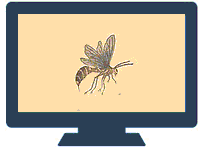Entomology, Department of

Department of Entomology: Distance Master of Science Projects
Date of this Version
2012
Document Type
Project
Citation
Entomology Distance Master’s Project, University of Nebraska-Lincoln, 2012
Abstract
Summary of Project
Goal: The goal of this project is to find effective management treatments for the bean leaf beetle (Cerotoma trifurcata) and soybean aphid (Aphis glycines) for use in certified-organic soybeans. The bean leaf beetle is one of the major vectors of bean pod mottle virus, which causes seed staining and can cause a downgrading of the soybeans at market from food grade to feed grade. Feeding from the soybean aphid causes stunted plants, reduced pods and seeds, and can transmit viruses that cause mottling and distortion of the leaves and a reduced seed set. Discolored seeds may also result from this infection. The use of organic pest management treatments may help organic farmers manage bean leaf beetles and the transmission of virus or fungal agents responsible for seed coat staining and maintain the premium received for organic food-grade soybeans.
Outcome and Significance: Findings of the experiment show that there were no consistent significant differences between treatments regarding bean leaf beetle populations and seed staining or aphid populations and soybean yields. Although the project did not result in any treatments providing significant control over bean leaf beetle populations or soybean aphid populations, the experiment is still meaningful in that it has shown the inefficacy of four products on bean leaf beetle and soybean aphid populations so future experiments can concentrate on other products, biological control agents, and/or physical trapping methods.


Comments
Copyright © 2012 Andrea McKern